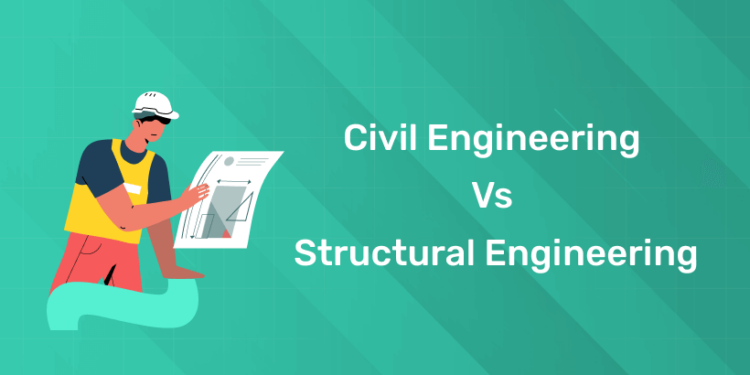Table of Contents
Civil and structural engineering are two closely related fields that are vital to infrastructure development and maintenance. Both fields deal with design, construction and maintenance of buildings and other structures but have different focus areas, responsibilities and skill sets. Knowing the differences and similarities between civil and structural engineering can help aspiring engineers choose the right career and specialization. This article will compare civil vs structural engineering in detail, highlighting the key points, responsibilities and career prospects.
What is Civil Engineering?
Civil engineering is one of the oldest and widest branches of engineering. It involves design, construction and maintenance of infrastructure projects like roads, bridges, dams, airports, water supply systems and sewage treatment facilities. Civil engineers ensure that these structures are safe, efficient and sustainable. They are involved in every stage of a project from planning and design to construction and maintenance.
Civil Engineer Responsibilities
- Project Planning and Management: Civil engineers plan and manage construction projects. This includes feasibility studies, detailed project reports and ensuring projects are completed on time and within budget.
- Design and Analysis: Civil engineers design infrastructure projects using advanced software and tools. They must ensure their designs are safe, functional and compliant to local regulations and standards.
- Construction Supervision: Civil engineers supervise construction activities to ensure projects are built according to design specifications and quality standards. They work with contractors, architects and other stakeholders to resolve any issues that arise during construction.
- Maintenance and Rehabilitation: Civil engineers maintain and rehabilitate existing infrastructure. This includes inspections, defect identification and repair and maintenance strategies.
Build A Career In Structural Engineering! Get Free Demo Classes!!
What is Structural Engineering?
Structural engineering is a branch of civil engineering that deals with the design and analysis of load bearing structures like buildings, bridges, towers and dams. Structural engineers ensure these structures can withstand various loads and forces like gravity, wind, earthquakes and other environmental factors. They ensure the safety, stability and durability of structures.
Structural Engineer Responsibilities
- Structural Design: Structural engineers design the framework of structures to safely support the intended loads. They use advanced software and analytical tools to create detailed structural designs.
- Load Analysis: Structural engineers analyse the loads and forces acting on a structure including dead loads (permanent), live loads (temporary) and environmental loads (wind, seismic etc.). They ensure the structure can withstand these loads without failure.
- Material Selection: Structural engineers select the right construction materials based on factors like strength, durability, cost and environmental impact. Common materials are steel, concrete, timber and composite materials.
- Safety and Compliance: Structural engineers ensure their designs comply with local building codes and safety regulations. They conduct thorough inspections and assessments to identify potential risks and ensure the structural integrity of buildings and other structures.
Differences and Similarities Between Civil Engineering and Structural Engineering
While civil engineering and structural engineering share many similarities, they also have distinct differences in terms of their focus, responsibilities, and skill sets. The table below provides a detailed comparison of these two engineering disciplines.
| Aspect | Civil Engineering | Structural Engineering |
| Focus | Broad focus on infrastructure projects | Specialized focus on load-bearing structures |
| Key Responsibilities | Project planning and management, design, construction, maintenance, and rehabilitation | Structural design, load analysis, material selection, safety and compliance |
| Design Scope | Roads, bridges, dams, airports, water supply systems, sewage treatment facilities | Buildings, bridges, towers, dams |
| Software and Tools | AutoCAD, Civil 3D, STAAD Pro, Revit | ETABS, SAP2000, Tekla, SAFE |
| Materials | Concrete, steel, asphalt, soil, and aggregates | Steel, concrete, timber, composite materials |
| Regulations | Local and national building codes, environmental regulations | Local and national building codes, structural safety standards |
| Key Skills | Project management, construction supervision, design and analysis, environment assessment. | Structural analysis, material science, load-bearing design |
| Career Opportunities | Construction firms, government agencies, consulting firms, infrastructure companies | Structural engineering firms, architectural firms, construction companies, government agencies |
| Average Salary (INR) | Entry-level: 3-5 lakhs per annum
Experienced: 8-12 lakhs per annum |
Entry-level: 4-6 lakhs per annum
Experienced: 10-15 lakhs per annum |
Build A Career In Structural Engineering! Get Free Demo Classes!!
Entri’s Structural Design Course
For those interested in pursuing a career in structural engineering, gaining specialized knowledge and skills is essential. Entri’s Structural Design Course offers comprehensive training in structural engineering principles, design techniques, and practical applications. The course covers topics such as:
- Fundamentals of structural design
- Analysis and design of various structures
- Material properties and selection
- Use of advanced design software
- Real-world case studies and projects
Why Choose Entri’s Structural Design Course?
- Expert Instructors: Learn from experienced structural engineers.
- Practical Approach: Gain hands-on experience with real-world projects.
- Flexible Learning: Study online at your own pace.
- Certification: Earn a recognized certificate upon completion, boosting your employability.
For more information, visit Entri Structural Design Course.
Conclusion
Both civil engineering and structural engineering are vital to the development and maintenance of infrastructure. While civil engineers have a broad focus on various infrastructure projects, structural engineers specialize in the design and analysis of load-bearing structures. Understanding the differences and similarities between these two fields can help aspiring engineers make informed decisions about their career paths.
Enrolling in Entri’s Structural Design Course can provide the specialized knowledge and practical experience needed to excel in structural engineering. This comprehensive course covers essential topics and offers hands-on learning opportunities, helping you build a strong foundation in structural engineering. Don’t miss the chance to advance your career – explore Entri’s course today and take the first step towards becoming an expert structural engineer.
For more details about the course, visit Entri Structural Design Course.
Frequently Asked Questions
What is the main difference between civil engineering and structural engineering?
Civil engineering focuses on the overall design, construction, and maintenance of infrastructure projects like roads, bridges, and water systems. Structural engineering, a subset of civil engineering, specializes in the design and analysis of load-bearing structures such as buildings and bridges.
What are the key responsibilities of a civil engineer?
Civil engineers handle project planning and management, design and analysis, construction supervision, and maintenance of infrastructure projects.
What are the key responsibilities of a structural engineer?
Structural engineers focus on structural design, load analysis, material selection, and ensuring safety and compliance with building codes.
What is the average salary for civil engineers in India?
Entry-level civil engineers earn between INR 3 to 5 lakhs per annum, while experienced civil engineers can earn between INR 8 to 12 lakhs per annum.
What is the average salary for structural engineers in India?
Entry-level structural engineers earn between INR 4 to 6 lakhs per annum, while experienced structural engineers can earn between INR 10 to 15 lakhs per annum.














